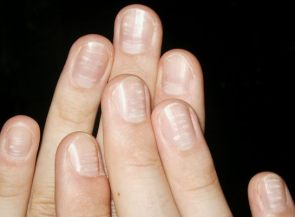Warning Signs of Zinc Deficiency
BySarah Axtell, ND •January 21, 2016
Zinc is one of the most common nutrient deficiencies I see. Zinc is an essential nutrient required for optimal health, DNA repair, immune function and brain function.

Signs of Zinc Deficiency:
- Delayed growth and development in children
- Temper control problems
- White spots on fingernails
- Ridged nails
- Poor immune function
- Poor wound healing
- Learning disabilities
- Decreased appetite
- Diarrhea
- Impaired taste and smell
- Skin rashes
- Hair loss
- Acne
- Depression
- Anxiety
It is by far the most frequently observed chemical imbalance in the mental health population. More than 90% of persons diagnosed with depression, behavioral disorders, ADHD, autism, and schizophrenia exhibit depleted plasma zinc levels, ranging from low-normal to severe deficiency. This may be due to increased oxidative stress associated with mental disorders. Excess oxidative stress leads to depleted zinc stores in the body.
Zinc and It’s Role in Brain Function:
- Zinc is required for the efficient conversion of dietary sources of vitamin B6 into the active form, PLP. PLP is needed for efficient synthesis of serotonin, dopamine, GABA and other neurotransmitters.
- Zinc deficiency can lead to excess copper, which can alter brain levels of “feel-good” chemicals, dopamine and norepinephrine.
- Zinc deficiency results in altered brain levels of GABA, our calming neurotransmitter that is often low in anxiety.
Who is at risk for Zinc Deficiency?
Zinc deficiency is common in vegans and vegetarians. Also, individuals with low stomach acid or people taking antacids are at risk because we need stomach acid to absorb zinc. Many medications deplete the body of zinc, such as antacids, diuretics, and birth control pills. Elderly individuals and a those with a history of an eating disorder are also at risk for zinc deficiency. Alcoholics and diabetics are at risk of zinc deficiency as well.
Food Sources of Zinc

Pumpkin seeds, red meat, potatoes, soy, oysters, legumes, and wheat germ are all good sources.
Here is one of my most favorite ways to enjoy pumpkin seeds.
Supplementation
The best, most bioavailable form of zinc is zinc picolinate. It is best to take with food as it is can cause stomach upset if taken on an empty stomach. Talk with your ND about the right dosage and whether or not zinc is indicated.
For a list of other common nutrient deficiencies I see in my practice, see here.
Editor’s Note: The information in this article is intended for your educational use only. Always seek the advice of your physician or other qualified health practitioners with any questions you may have regarding a medical condition and before undertaking any diet, supplement, fitness, or other health program.